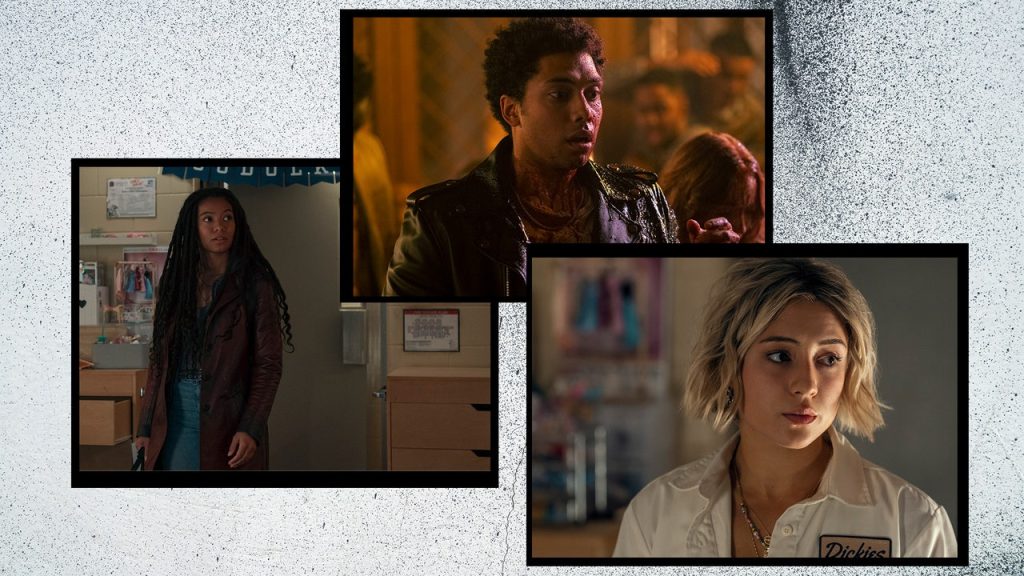On The Boys, Prime Video’s bloody and anarchic superhero satire, pretty much anything goes. No joke is too dirty, no display of gore too grotesque. It’s fun, and exhausting. Now imagine that same eagerness to shock transmuted into the form of a hormonal college student. Or don’t imagine it: Just watch Gen V, a Boys spin-off series premiering on September 29.
What works about the series—developed by Boys showrunner Eric Kripke, Evan Goldberg, and Craig Rosenberg, executive produced by Michele Fazekas and Tara Butters—is what works about its predecessor. Gen V, about a college for kids with superpowers, is compellingly gnarly, a further dive into a world in which superheroes have become the center of a brutal attention economy. Gen V and The Boys share a merry nihilism, a hyperbolic tweak of our sick, sad influencer times that sees little good in anyone.
Sometimes that satire is astute. Gen V cleverly filters contemporary adolescent concerns through its superhero matrix: Disordered eating and cutting are addressed via two characters’ particular abilities. Another character, played by two actors, fluidly shifts between gender presentation, a vivid flouting of the binary.
Other times, though, Gen V peddles its transgressive bona fides too hard. The show is powerless against its baser impulses, frequently opting for cheap comedy when restraint would have served it better. Do we really need to see a tiny freshman—like, Ant-Man tiny—clinging to a penis three times their size in a depressing hookup scene? If we simply must, then do we also need to see a penis—a different penis, belonging to a different jerk—literally explode? Gen V wants to offend delicate sensibilities, but in so doing undermines whatever nuance and texture it’s also trying to create.
The actors involved are more than capable of the subtle stuff. Jaz Sinclair plays Marie, a freshman at the not-so-secretly evil Godolkin University (God U for short, har har) whose blood-manipulating powers led to a terrible accident some years prior. Sinclair shrewdly communicates Marie’s tortured ambition, while Lizzie Broadway (a name for the ages) offers both comic relief and arresting pathos as Marie’s size-shifting roommate, Emma. They and their nascent band of avenger friends are alternately supported and thwarted by Shelley Conn’s Indira Shetty, the steely head of the university who, of course, has a dark agenda waiting to be uncovered.
Six episodes of Gen V were sent to critics, the majority of which are engaging more than they’re irksome. The central mystery of the season, involving a missing teen and a sinisterly clandestine laboratory connected to the university, is teased out well, information revealed in tantalizing increments. But the season sags as it goes. By the sixth episode—one of those aggravating mind-palace journey episodes that mostly exist to flatter their writers—Gen V has lost its way, seemingly unsure if it’s still a generational spoof or if it’s morphed into a probing trauma drama.
I suppose it could be both, but that balance would require nimbler, gentler hands at the helm. The Boys is plagued by a similar problem: the world of these series is so grimly arch and freewheeling that pretty much anything is possible. Which makes it hard for any concrete character development, any real emotion or sentiment, to find traction. The stakes are both high and nonexistent; everything matters and nothing does. What does death mean on a show that so happily depicts the absolute ruination of so many human bodies?
That careless blood lust sits more comfortably alongside Gen V’s parody of contemporary cultural mores. Like The Boys, this new series has a refreshingly cynical view of corporate power and viral fame. Godolkin essentially serves as a talent incubator for Vought International, the depraved conglomerate that invented superheroes and now ruthlessly profits off of them. Gen V presents a generation of kids fully under that company’s thrall, obsessed with its metrics of success and desperately clamoring to become one of Vought’s prized show ponies.
It’s a bleak approximation of social media’s insidious grip on the hopes and preoccupations of millions of kids, who so willingly throw themselves into the meat grinder for the vanishingly small chance to be seen. Or maybe they don’t throw themselves in as much as they have been born already inside it. Gen V explores that awful reality with a despairing chuckle. But the show could push further than it does, honing its inquest into something truly and appropriately damning. Such incisiveness might get in the way of a gag in which a mind-controlled security guard fellates a flashlight that will soon be stuck up his rectum. (Off camera, at least.)
Gen V constantly resorts to icky humor for fear of losing our attention. Despite its flash, its swaggers of confidence, this is a curiously self-conscious, uncomfortable show, forever offsetting its earnestness as if needing to prove its coolness. Which might be its most apt, if accidental, parody of what it is to be young and hungry for approval.
